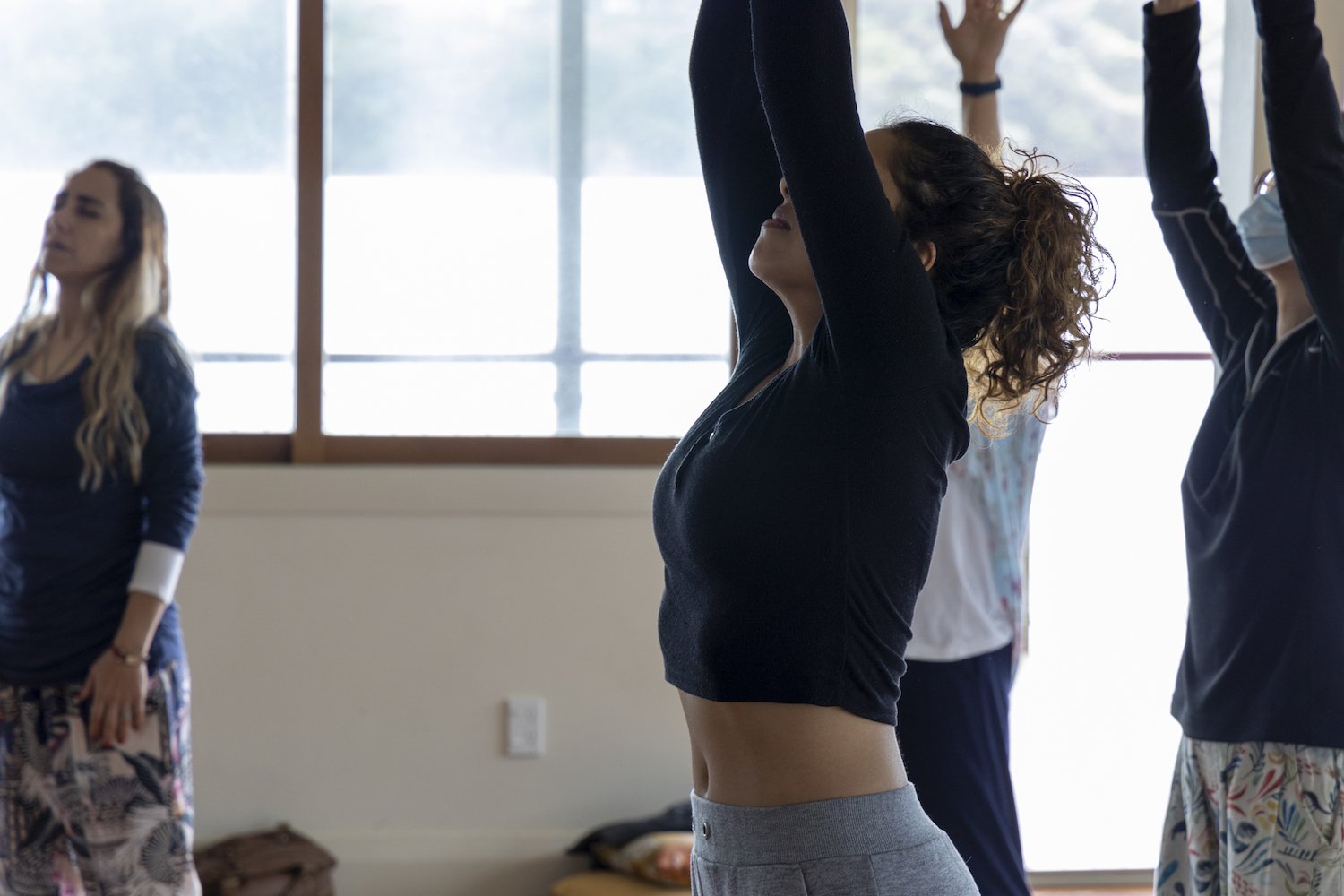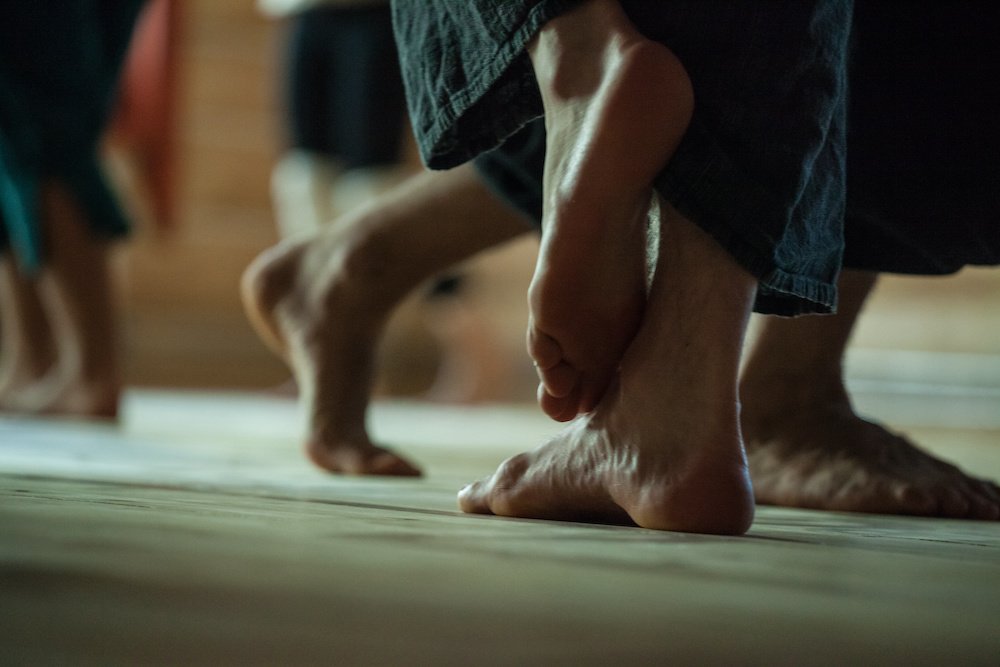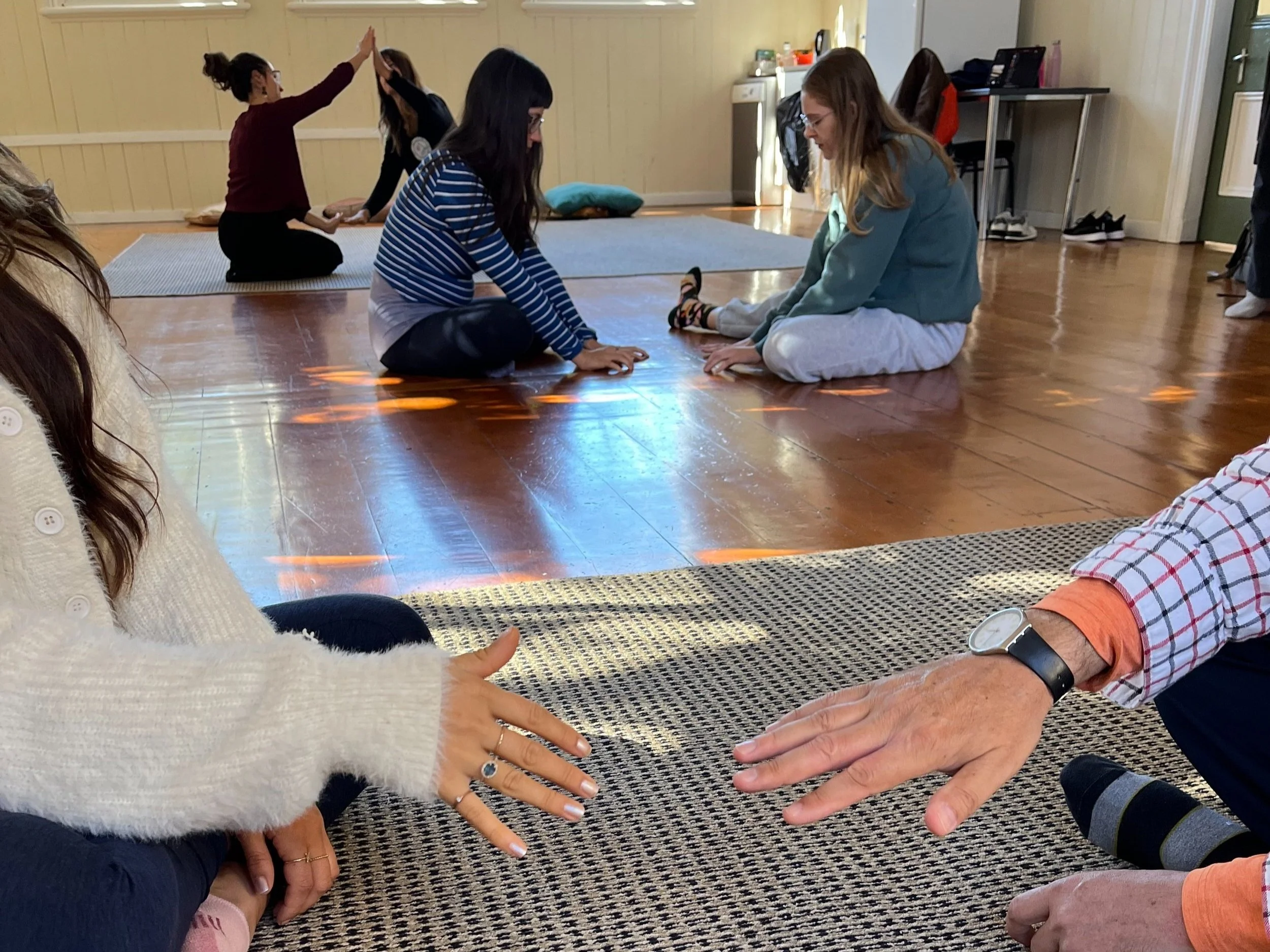
YEAR ONE
DIPLOMA IN DANCE MOVEMENT THERAPY
OVERVIEW of year one
This first year is designed for those who are interested in developing skills to work in the field of Dance Movement Therapy in the future, or those who would like to integrate therapeutic dance into an existing related professions. Counselling, psychotherapy, psychology, teaching, occupational therapy, or physiotherapy are some other fields in which dance therapy can be integrated into. It is also ideal for arts therapy trainees who wish to specialise in dance movement therapy as part of their training. We also have students coming from unrelated backgrounds such as law or corporate work, who develop into wonderful dance movement therapists through journeying with us.
COURSE CONTENT
The first year is experiential in nature, utilising current DMT practice and tools to develop embodied skills and understanding. This experiential learning will be supported by a strong theoretical base, provided through workshops, lectures, tutorials, supervision, coursework and readings throughout the year.
The first year consists of six modules - an initial 13 hour Introduction to DMT seminar (Module One) which can be attended in-person or online in October (or as a make up seminar in February if you have missed the earlier seminar).
The remaining modules are taught over five 17 hour modules March - December. Students can attend online only, or a combination of online and in person workshops. Year one cohort will have dedicated trainers and support team to ensure optimal learning throughout the year.
In addition, online tutorials, supervision and simulated practicum sessions will be offered between the seminars on zoom.
Each student will participate in a 30 client hour placement during the first year, to observe and assist in Dance Movement Therapy and other settings to gain practical experience and apply their learning. This can be done outside of NZ.
Year one consists of a minimum of 180 hours including placements, plus 45 optional hours (excluding assignments, readings and placement administration).
Training modules will be taught by experienced dance movement therapists, and will include guest presenters who are experts in the field of dance movement therapy, both Nationally and Internationally.
YEAR one
year one MODULES
-
This module will introduce students to the historical and cultural background of dance for healing and to the origin and development of dance movement therapy (DMT) as a profession. Students will be introduced to foundational skills and practices in the field of DMT, allowing students to experience a variety of DMT approaches firsthand. Relevant theory and concepts will be presented to support the experiential learning, and to assist students to reflect on how these practices may be used therapeutically. This module will explore fundamental dance and wellbeing practices, with reference to the work of key originators who have developed the profession.
-
To practice DMT, we need to gather a range of practical tools and skills that are connected to theory and methods. This module begins this process of gathering as we explore the biomechanics of movement, Laban movement dynamics, elements of a DMT session, group process and an orientation to ethics, professional practice and self care. During each module in the first year, we will focus on a particular practical element of DMT skills, and in this module we focus on session flow and the use of props.
Our first year course focuses on the context of facilitating DMT groups, as this is the setting where most students in their first year will begin their placement experience. Many of the concepts apply to individual practice as well, however individual applications will be further developed in Year 2. To understand and effectively work with groups, theories of group dynamics and other related theories will be introduced to provide a ground from which to begin.
-
This module aims to introduce students to key theories that underpin and inform dance movement therapy including theories of psycho-social development, attachment, cultural models & relevant counselling theory. This theoretical knowledge provides a solid ground upon which the application of DMT practice can rest. The theory will be introduced utilising practice-based methods and population specific examples, in order to further develop students’ experiential knowledge alongside their theoretical understanding. The person-centred approach will be utilised as a primary model in this and future modules to give students a more comprehensive understanding of one key model that offers immediate practical application to the field of DMT. The therapeutic relationship is fundamental to all theoretical approaches, and this is regularly the most significant element enabling a client to grow and change. Safety is also foundational to any DMT work, and this is addressed on both physical and other levels to support the therapeutic process. Components of a DMT session are further explored, along with DMT skills around utilising techniques and forms from dance practice.
-
This module will introduce you to systems for describing and assessing movement through non-verbal movement observation, the physiology of movement and the theories behind movement development/preferences. It will provide frameworks for how DMT can enhance and develop movement patterns to support therapeutic goals.
These systems and frameworks are comprehensive and at times complex; this module will introduce this work, and the concepts and theories taught will be built on and developed throughout the rest of the course.
The initial focus will be on understanding and describing your own movement and how this relates to other internal and external aspects of yourself and your history. The module will utilise practice-based experiences to both teach key concepts, and to support the expansion of your own movement practice.
An important element underpinning this module is that the greater functional and expressive range we have in our own movement, the fuller psychological expression we have access to, the more choices we then have in life. When we maximise our own movement range, this also increases the resources we have available to support future clients.
This module takes a hands on, practical approach, enabling students to develop useful ‘how-to’ skills and methods which can be taken into placement settings. This can include how to select music and props, along with how to demonstrate empathy and build connection through movement.
The therapeutic relationship is a key element, which can be the most significant element enabling a client to grow and change. Safety is also foundational to any DMT work, and this is addressed on both physical and other levels to support the therapeutic process.
-
Dance movement therapy uses dynamic and ongoing processes to continually assess and reassess what a client or group of clients may need. These processes provide key tools and frameworks to support our grasp of what is happening for a client, and where their growth areas may be. The more deeply we can understand our clients – on a movement level as well as who they are, where they come from and what they need – the more effective our interventions can be.
Part of this process involves being able to identify and set key goals in collaboration with clients that act as markers in our group sessions, guiding the improvisation and creativity that are also fundamental to the DMT approach. The process of assessment in DMT, and how assessment can guide session planning and intervention, will be an ongoing learning process that continues through this module, the rest of this year and into Year 2.
This module builds on foundational knowledge of group dynamics and processes from module two, and develops further skills and experiences applying these tools to DMT group work with adults, and with children. In Year 2 this knowledge will be further developed, with the focus broadening to include individual DMT work with clients.
-
Through placements this year, you will have been introduced to a range of different clients and contexts for DMT and other therapeutic work. Some elements of DMT practice are universal – others are specific to the context and group of people you are working with. This module will go deeper into specific examples of different populations, and how DMT group work can be applied in these areas. There will be case presentations along with space to bring your own experience and observations of specific client populations, and to share your knowledge with the group.
In preparation for the end of this year, and to prepare for Year 2, professional practice aspects will be explored. These include how to keep clinical records, boundaries, ethical considerations, self-care, and how to refine and adapt an ‘elevator pitch’ to promote and explain concisely what DMT is and why it is beneficial. Some basic research skills will also be covered to ensure you have the resources you need to write your final group case study.

COURSE DATES
Module One:
In Person: 11-12 October 2025, 9.30am-5pm
Online: 21-23 November 2025, Friday 6-9.30pm, Saturday 3-6pm, Sunday 10.30-6pm (NZT)
Make up: Saturday 14 February 2026, 1:30pm-5:30pm NZT
Module Two:
A: March 13th: 5.30pm-9.30pm (online only), 14th: 10.30am-6pm (in person option available)*
B: April: 10th: 5.30pm-9pm, 11th: 3-6pm*
Module Three:
A: May: 8th 5.30pm-9.30pm (online only), 9th 10.30am-6pm (in person option available)*
B: June: 5th: 5.30pm-9pm, 6th: 3-6pm*
Mid year break: 29 June-19 July 2026
Module Four:
A: July 31st 5.30pm-9.30pm (online only) & August 1st 10.30am-6pm (in person option available)*
B: August 28th: 5.30pm-9pm & 29th: 3-6pm*
Module Five:
A: September: 25th 5.30pm-9.30pm (online only) & 26th 10.30am-6pm (in person option available)*
B: October: 23rd: 5.30pm-9pm & 24th: 3-6pm*
Module Six:
A: November: 27th 5.30pm-9.30pm (online only) & 28th 10.30am-6pm (in person option available)*
B: December: 4th: 5.30pm-9pm & 5th: 3-6pm*
All times below in NZST (2026 dates)
Each Module has two parts that all students attend - A & B
YEAR one SEMINARS 2026:
*Optional Experiential DMT Workshops:
In-Person on Sundays 10am-4pm, every two months (A-part):
March 15th, May 10th, August 2nd, September 27th, November 22nd (no extra charge for year one students). Workshops are held in Onehunga, Auckland New Zealand.
OR
Online on Saturdays 11:30am - 1:30pm, every two months (B-part):
April 11th, June 6th, August 29th, October 24th, December 5th (no extra charge for year one students). Workshops are held via Zoom.
Supervision Tutorials:
2 hour supervision tutorial every month (various time options available)





